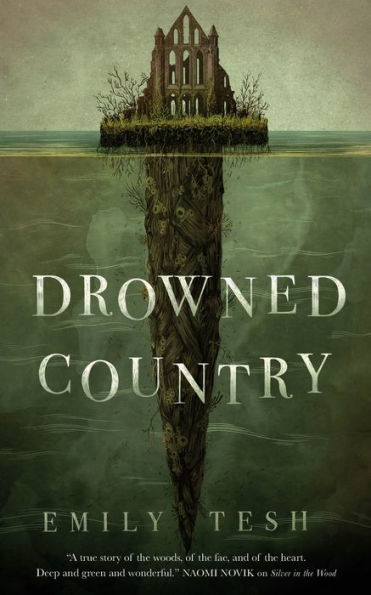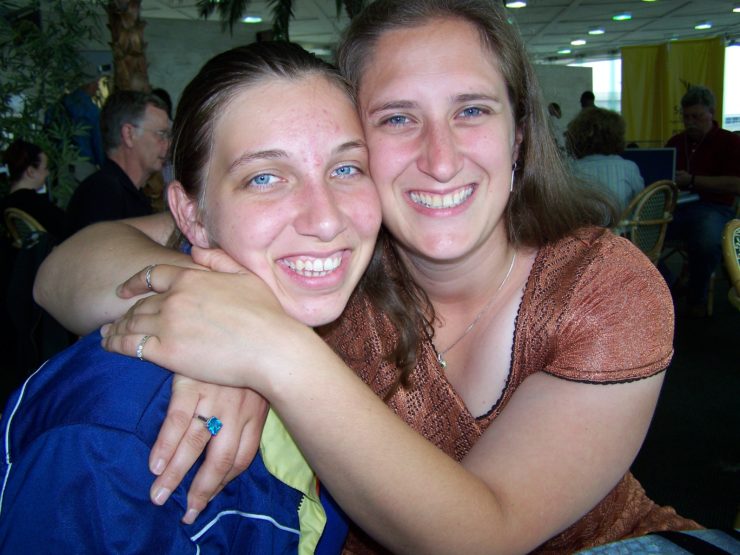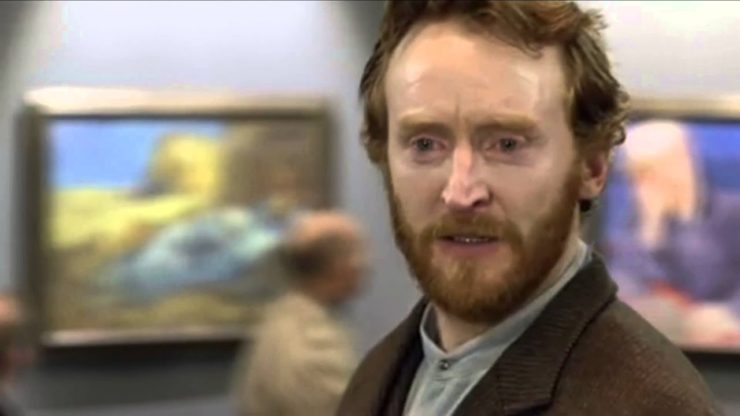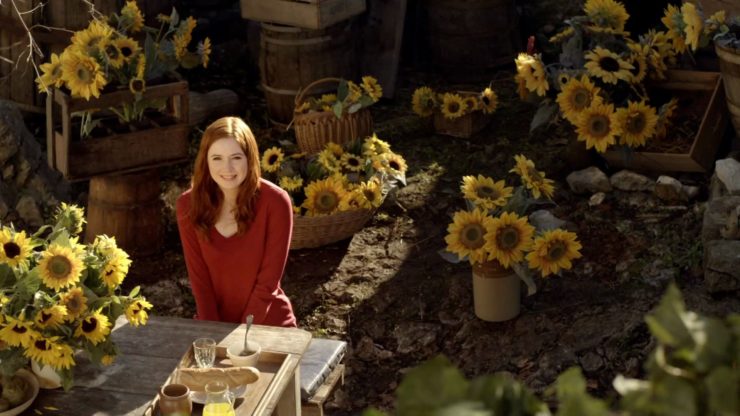“Does the name Vincent Van Gogh ring a bell?”
“Don’t mention that man to me…he’s drunk, he’s mad, and he never pays his bills.”1
When this episode of Doctor Who begins, we laugh at the absurdity that this restaurateur would reject one of the most famous paintings in the world because the man trying to hawk it was a bit of a drunk. Any of us would accept this piece, even if we’re not personally fond of the man’s work. We know its value, which is: practically priceless.
[Content Warning: this essay includes discussion of mental health, schizophrenia, and suicide]
The episode tells a fictionalized version of Vincent Van Gogh’s last days before his deepest plunge into depression. I personally like to think it happened this way, not because I love the Doctor and Amy, but because this would mean that the art darling would have known that he was loved, despite all the agony he experienced and the fact that he only sold a few paintings during his lifetime.
Van Gogh suffered from mental illness, though he was simply diagnosed as having “madness and an attack of fievre chaude (hot fever),” or being insane, according to fellow artist Paul Gaugin, who briefly lived with Van Gogh in the Yellow House.
When this episode of Doctor Who came on, something I had lost hope in ever happening finally did.
Vincent Van Gogh faced a monster that no one else could see—except the few who looked closely at the man’s painting of The Church at Auvers.
Buy the Book


Drowned Country
The Madman with a Blue Box noticed this tiny, strange face and hurried back in time to discover the origins. What he found was a man driven mad by mental illness, depicted so aptly as an invisible monster.
“No one ever buys any of my paintings or they would be laughed out of town,” Vincent tells the Doctor, with all those around nodding in strong agreement. The implication that Van Gogh would be run out of town is clear. And, in real life, he was, thanks to a petition signed by the residents of Arles.
The scene brought me back to a night in 2014 when I received an unexpected phone call. “I have to tell you something about Elizabeth.”
Receiving strange news about my friend Elizabeth wasn’t that unusual, though it was uncommon for her mother to call at that hour.
Seven years prior, Elizabeth had been diagnosed with schizophrenia. She heard voices that told her to do things that weren’t good for her. Hallucinations scared and confused her. When she read her favorite book of the Bible, Romans, she believed that God was speaking personally to her.
“God is telling me to kill myself,” she told me on more than one occasion. “I don’t know if I want to. But I want to obey God.”
“God is not telling you to kill yourself, I promise. He doesn’t want that.”
This beautiful girl I’d known since 2002 was no longer the “sunshine girl” of my memory. She was still Elizabeth—the girl with whom I had started a homeless ministry in college and backpacked Russia and Europe—but she was not like the Elizabeth I had known.
My best friend was ill. She felt broken. Devastated by what she thought was God commanding her to do something she knew wasn’t right. But the voices were relentless.
Some days, she called to ask me whether or not she should drink water or if food was the answer to hunger. Other days, she seemed more like herself, speaking of family and relationships that weren’t colored strangely through the lens of her mental illness.
These voices—and the medications she took—changed the way her brain processed information. The illness changed the way she viewed the world. Our conversations no longer revolved around Jesus, missionary work, and the arts. Now, our conversations were filled with hurtful words.
It felt as though the illness filled her with anger, depression, and confusion. Our relationship suffered and eventually was severed in 2011 when the unhealthiness became clear to both of us.
We parted with these words:
“You are my best friend. Nothing will ever change how important you are to me. Nothing will ever make me love you less. If there’s ever a time you need me, I am here. I love you. I will always love you.”

For the next two years, we checked in with each other via mutual friends. Her mother or sister would give me an update or call if she needed something. In 2013, Elizabeth stopped taking her medications and often abandoned her car in parking lots, slept in parks, skipped meals on the regular, and didn’t use the financial vouchers or money she had to take care of herself.
By Autumn of 2014, I had no idea where she was. Occasionally, sightings by family and friends were shared, but none of us knew where she spent her days. Until the night of September 11, 2014.
“She was outside a restaurant. People were afraid of her erratic behavior. They called the police on her.” The broken sentences crackled over long-distance to Chicago. “Rita, she’s gone. They don’t know what happened. They took her to the hospital. She’s gone.”
At first, I listened to her mother in shock. Both Elizabeth’s mom and sister called me that night. I needed to love and support them. My mourning would have to wait.
When I hung up, I didn’t know what to think. Or feel. Elizabeth had been suffering for seven years. She hated this life with schizophrenia; she had told me so often. She had done things to hurt herself, turned her back on the dreams she’d had of becoming a missionary to Russia, and turned away from the God she so loved.
I felt relief. And then guilt for feeling that relief. I was glad her suffering was over, but should I be? The question haunted me for years, as I struggled, unable to mourn my best friend. That pain remained balled up tightly in a numbness that I—the girl who can cry on cue—had not been able to express.
In the episode, the Doctor found Vincent lying in bed, curled up and crying. Flashes of 2007 came back, reminding me of the nights after Elizabeth’s diagnosis. She would call in the mornings and I would spend the day helping her with tasks. Brushing teeth, drinking water, combing hair all had become burdens for Elizabeth. At the end of each day, I curled up in a ball and wept for her.
Vincent’s tears gave voice to my grief.
Amy Pond gave sunflowers to Vincent, hoping they would inspire more paintings. The Doctor took him to the museum where the gallery of Vincent Van Gogh’s work drew thousands of visitors a century later.

With Vincent standing near, the Doctor asked the curator, “Between you and me, in a hundred words, where do you think Van Gogh rates in the history of art?”
“Well, big question, but to me, Van Gogh was the finest painter of them all. Certainly…the most beloved…He transformed the pain of his tormented life into ecstatic beauty…To my mind, that strange, wild man who roamed the fields of Provence was not only the world’s greatest artist but also one of the greatest men who ever lived.”
The villagers were afraid of Van Gogh, so they voted him out of town. The restaurant patrons in California were afraid of the mutterings of a woman with a mental illness, so they called the police.
That night, Elizabeth went into cardiac arrest for seemingly no reason at just 30 years of age. In the timeline of the Doctor Who episode, Van Gogh took his own life a few weeks after he saw his artwork immortalized.
Amy and the Doctor returned to the museum one last time, Amy hopeful that there would be hundreds of new Van Goghs hanging in the gallery. There were none. The timeline had not changed, but there was something different about two of the paintings. The monster from the church window was gone, and across the vase for the sunflowers is scrolled, “For Amy, Vincent.”
Vincent’s gift to Amy reminded me of something Elizabeth’s mom told me the week after Elizabeth died. “She had photos on her when she passed. Photos of you and her together.”
Amy had her painting. I have the knowledge that time and space could not change how Elizabeth and I loved each other.
Vincent’s suffering paralleled with Elizabeth’s in so many ways. Amy’s hope and desire touched on mine. This beautiful telling of the final days of Vincent Van Gogh and the terribly painful mental illness he suffered frees my heart to weep.
“No new paintings. We didn’t make a difference at all,” Amy concluded.
“I wouldn’t say that,” the Doctor responds. “The way I see it, every life is a pile of good things and bad things…The good things don’t always soften the bad things, but vice versa, the bad things don’t necessarily spoil the good things or make them unimportant. And we definitely added to his pile of good things.”
You did make a difference, Amy. For Vincent and for me.
If you or someone you know are struggling with mental health, please find helpful resources below:
- Lifeline Crisis Chat: https://www.contact-usa.org/chat.html
- Crisis Text Line: Text REASON to 741741 (free, confidential and 24/7)
- National Suicide Prevention Lifeline: 1-800-273-TALK (8255); www.suicidepreventionlifeline.org
- Suicide Prevention, Awareness, and Support: www.suicide.org
Rita Juanita Pike is the granddaughter of aviatrix, Jerrie Mock, first woman to pilot an airplane solo around the world. Rita has taken inspiration from her grandmother’s life and flight and pursued many of her own dreams in theatre, podcasting, novel writing, and cooking up delicious food from around the world. She now writes on food, travel, pets, faith, and the arts. She’s happily married to Matt, and faithfully serves the very fluffy kitten queen, Lady Stardust.
[1]All quotes from Doctor Who: Episode 210, Vincent and the Doctor, by Richard Curtis, unless otherwise indicated.











“Lord, what a world of heartbreak it is.” – Mark Twain, A Connecticut Yankee in King Arthur’s Court
I remember that episode of Doctor Who, because it also moved me deeply. Thank you for this essay.
I haven’t seen this episode though I can somewhat relate. My son has juvenile onset but we were there, got him into inpatient for just over a year and he’s med compliant. It’s a struggle and I pray I’ll be around long enough to give him what he needs to be a functioning adult.
He has often wondered what could possibly be evolutionarily useful about his condition. I usually fall back on the shaman theory but that’s not really it. No, our survival as a species is dependent upon our mutual altruism. We succeed when we help each other not out of any expectation of reward but because it is the right thing.
In this story, it sounds as if Amy and the Doctor did the right thing, just because.
Beautifully put.
Sigh. I don’t know how to respond to this article, but thank you for writing it and pouring your heart out. “Vincent and the Doctor” is in my top-five of Doctor Who episodes and it almost always makes cry and I don’t even have a particular reason for such. And so as I read about you and Elizabeth and Vincent and Amy and the Doctor and your experiences and your emotions and…well all of that, I just couldn’t help but tear up again.
Thank you for sharing such a personal story and for your encouragement and for your heart to care for others.
Thank you so much for sharing your story with us. I’m coming into this with baggage on both sides of the situation and watching this episode (apparently even reading about it) fucks me up something fierce. Not in a bad way, though.
Sis, I love you and this piece of your heart. Thank you for sharing it. <3
> Now, our conversations were filled with hurtful words.
Oh god this hits home. I never understood how mental illness drove people apart until I had to deal with it in my family. So many nights I’ve been left in a mess as the mentally ill family member lashes out with such precision at everyone around him.
It’s no use pretending being around somebody with severe mental illness isn’t upsetting and frightening – but think how much worse it is to the person suffering from mental illness!
There’s a theory that Vincent didn’t commit suicide but was accidentally shot by some boys who liked to ‘tease’ him. IMO Vincent’s words ‘Do not accuse anyone, it is I who wanted to kill myself.’ strongly implies something of the kind. However that met be, knowing his work would be appreciated in the future would have been a great gift to Vincent, or any artist.
Hands down, the BEST Dr Who ep – ever. Certainly, to me, the most moving. It touched – something. Many of the same things your essay did, Rita.
I had to put on Don Mclean’s, “Starry, Starry Night” immediately after watching.
@9: https://www.youtube.com/watch?v=jaHVKQlPr6U
Thank you for sharing your terrible loss. I haven’t suffered that misfortune, but ever since high school (mid-to-late 60s) when I studied Van Gogh’s life (on my own, it wasn’t taught), I have mourned the fact that he never knew how beloved he was to become, and this episode of Doctor Who is my very favorite because of that wish-fulfillment. If only it could have happened. And the Doctor’s words you quoted brought the power of the episode to its perfect conclusion. They can comfort any of us who love people who just can’t seem to understand how wonderful they are.
Thank you for sharing this, and don’t worry, no one blames you for feeling relief that her suffering was over. It can be hard to admit, but when she passed, we were all somewhat relieved that she was no longer suffering, even though we all missed her very much.
I would like to say though, that our family is very appreciative of everything that you did to be there for Elizabeth as well as us. Also know that at least I personally don’t blame you for having no longer been in contact with her at one point. The whole thing was very difficult for all of us, and sadly no matter what we did or would have done, it can be difficult to know if anything would have been different, as we can only continue into the future and can’t back to try something different.
Lastly, it is interesting that you mention Dr. Who, as Elizabeth used to watch the show at one point. Also if ever wish to chat, you are welcome to contact me in addition to my mother. Hope you are doing well.
@@@@@ 2, wlewisiii:
He has often wondered what could possibly be evolutionarily useful about his condition. I usually fall back on the shaman theory but that’s not really it. No, our survival as a species is dependent upon our mutual altruism. We succeed when we help each other not out of any expectation of reward but because it is the right thing.
Nature, including human nature, operates in ranges.
Consider leadership among foraging peoples. It is mostly depends on personal character. Especially in tough times, a charismatic leader can gather everyone to do the necessary. Be that defeating a hostile tribe, or cutting and running from them. Finding better territory to stave off starvation, or exploiting a new food source. The right balance of vision and leadership and good choices can save the day.
Take the same person, give him too much of what a good leader needs. You get an asshole and a bully that nobody wants around. He makes too much trouble. He cheats and freeloads. He wrecks relationships. If he leads, he’ll lead you over a cliff. Such a character is frequently kicked out of the tribe, or murdered.
In both cases, the bundle of qualities are the same. The amount of them, the proportion of them, is what differs. That is tough on the man with too much of a good thing—because that is a bad thing. But it’s inevitable. If you want good leaders, you must put up with those who miss the mark. Because nature works in ranges.
The same is true of the Shaman. He performs necessary roles in maintaining social relationships. Dealing with problems of body and spirit. Encouraging sharing and fairness. Settling festering arguments that might split the band. A shaman needs wisdom, practical psychology, and spiritual awareness to bring people together in challenging times.
Take the same person, give him too much of what a good shaman needs. You get someone unable to fend for themselves. Through no fault of their own. It is not easy to carry a full bowl. Van Gogh is an example of someone at the balance point. Creatively brilliant. Too eccentric for the world.
It is not that your son’s condition is evolutionarily useful. It is that his condition is a necessary concomitant of something that is evolutionarily useful. Because nature operates in ranges.
Okay, I admit it, I was ugly-crying at the end of this article. It was beautifully written, and I love that episode; easily in my top five. That episode really is a great example of What To Do – just love on someone and pay no thought to the outcome, just Do What’s Right. Thank you so much for this, and I’m so sorry for what you went through.